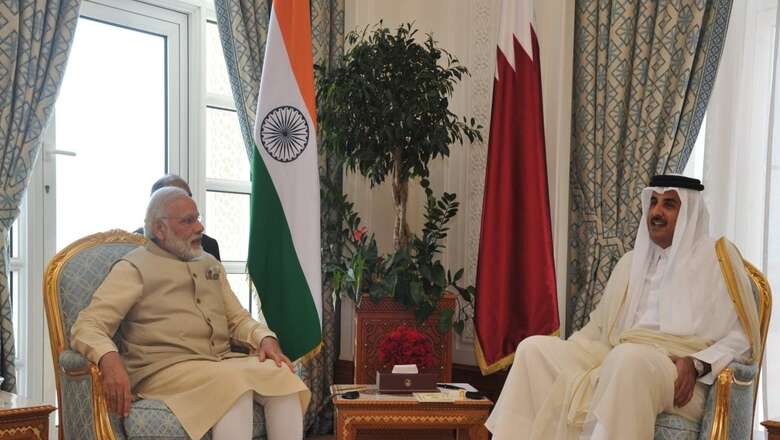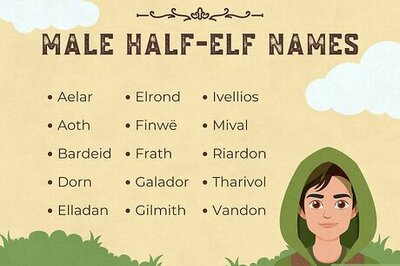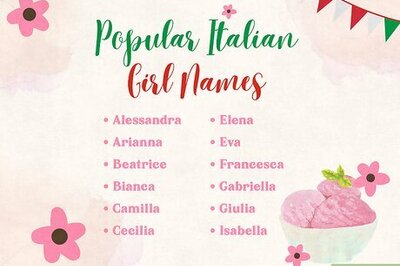
views
The release of eight Indian Navy personnel from Qatar after months of backchannel talks, and Prime Minister Narendra Modi’s intervention, is the new diplomatic triumph for India.
The eight navy veterans, seven of them returned to India on Monday, according to the Ministry of External Affairs, were charged with espionage and sentenced to capital punishment.
India has “welcomed" the decision to release the navy veterans, who were working for Dahra Global company in Qatar.
Who are the eight Navy veterans?
The former Indian Navy personnel are Captain Navtej Singh Gill, Captain Saurabh Vashisht, Commander Purenendu Tiwari, Captain Birendra Kumar Verma, Commander Sugunakar Pakala, Commander Sanjeev Gupta, Commander Amit Nagpal and Sailor Ragesh. They had stints of up to 20 years in the Indian Navy, and held important posts including that of instructors in the force, former military officials said.
According to PTI, Captain Gill was awarded the President’s Gold Medal for excellence when he had graduated from the Naval Academy and had later served as an instructor at the Defence Services Staff College at Wellington in Tamil Nadu.
How India Continued Its Support to Navy Officers
The MEA remained steadfast in providing consular and legal access assistance to the eight navy officers. It had previously said that they were in close touch with the legal team as well as the family members to decide on the next steps.
PM Modi’s discussions with Qatar’s Emir Sheikh Tamim bin Hamad Al-Thani during the COP28 summit in Dubai focused on the importance of bilateral ties between the two countries, and welfare of the Indian community in Qatar.
How India Came to Qatar’s Rescue in 2017 Blockade
Qatar was blockaded by Bahrain, Egypt, Saudi Arabia and the UAE over alleged support of Islamists and Iran. They sought to pressure Qatar into capitulating to the Anti-Terror Quartet demands. Qatar has accepted that it was providing assistance to Islamist groups such as Muslim Brotherhood, but denies helping terror outfits like al-Qaeda and Islamic State.
In 2017, the land and sea borders with Qatar were closed by neighbouring countries. Although Arabian emirate imported 90% of its food through the Abu Samra crossing, Qatar was forced to restructure its food import routes after the Saudi-Qatari border was closed down on June 5, 2017.
India also solved the acute food crisis in Qatar by setting up new sea supply line called India Qatar Express Service. The line links Hamad Port in Qatar with Mundra (Gujarat) and Nhava Sheva Port (Maharashtra) in India, the Minister of Transport and Communications (MoTC).
In the recent times, India and Qatar have established joint business and investment ventures to enhance Qatar’s agricultural resources.
What Changes in Bilateral Ties?
India has last week signed a $78 billion deal with Qatar to extend LNG imports by another 20 years till 2048 at rates lower than current prices. At current prices, India will save $6 billion over the contract period.
LNG is the main component of India-Qatar trade ties, as it makes up to 50% of overall Indian imports from Qatar.
Qatar’s key exports to India include LPG, chemicals and petrochemicals, fertilisers, plastics, and aluminium articles, while India’s key exports to Qatar include cereals, copper articles, iron and steel articles, vegetables, fruits, spices, and processed food products, electrical and other machinery, plastic products, construction materials, textiles & garments, chemicals, precious stones and rubber.
The gas deal is a step towards PM Modi’s vision to make India a “gas-based economy" and increase the share of natural gas in India’s primary energy basket to 15% by 2030, said Akshay Kumar Singh, CEO, Petronet.




















Comments
0 comment